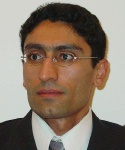We have interviewed last week Dr. Ahmed H. Al-Marzouqi.
Dr. Al-Marzouqi has received his PhD in Biochemistry & Molecular Biology from the Pennsylvania State University (2002). He is an Associate Professor in the Department of Biochemistry at the Faculty of Medicine and Health Sciences and has been working in the area of Molecular and Cellular Biology for the past 16 years. His research interests focus on understanding the basic concepts of how genes are controlled by epigenetic marks and how that affects cancer initiation and progression.
ARJ: What do you think about The All Results Journals and their scope?
I think there is a lot of data that is not published because researchers and scientists feel it is negative, so having the journal like this could provide a scope for all such data to be published. I am sure that the amount of negative data is generated more than the positive data in many fields. So the scope is good if it has a good indexing and reasonable impact factors. It is important to publish all those data. For example, I have some negative data and somebody else also comes up with the same result, then we know it is true and real.
ARJ: What is your opinion about the publication of negative results?
I have previously answered most of it earlier. It is very important to publish negative results. When others get the similar results, one gets satisfied that this is not due to experimental inconsistency and is a true result. Secondly, publication of negative results will help to improve in making the hypothesis.
ARJ: Why are we still using the words“negative result”? Don’t you think that whatever comes after a research is itself a result?
People have hypothesis when they do the experiments. When you have the hypothesis and questions; one does experiments to address such questions. The answer is either Yes or No. Hence when the answer is yes, it is referred to as positive results and in case of no, it is a negative result. In short, positive or negative result is based on hypothesis.
ARJ: How easily an experienced researcher like you distinguishes between a negative result and a false negative (experimental inconsistency)?
Experiments should have the proper controls like positive controls and negative controls. Moreover, the controls and the experiments should be reproducible.
ARJ: Do you have any experimental methodology to isolate false negatives?
Use of proper positive and negative controls and review of hypothesis is useful in isolating the false negative results.
ARJ: When you get a negative result what comes immediately in your mind, discard the result, keep it in your file drawer or proceed to publish?
Normally and personally I do not publish the negative results unless it is part of a bigger picture. At the first instance re-do the experiments with proper controls, then review the hypothesis and then use some alternate hypothesis as the negative results might be due to wrong assumptions. I keep all such records in the laboratory note book.
ARJ: How do you normally manage negative results in your lab/team?
Repeat the experiment and obviously it is recorded in the laboratory note book of the students and technical staff. If there is any similar case, you have to go back. After a long period, say after six months or a year another question comes up then this record helps in solving the problem. It helps to answer the new question and design the new experiment.
ARJ: As an associate dean for research, would you recommend other faculty members to publish genuine negative results in The All Results Journals?
Yes, I definitely recommend the faculty members to publish genuine negative results in any journal obviously as long as they are confident that their results are not false negative. As I said it is important to publish the negative results because it could help other researchers to design their experiments in better way, to think in the right direction so that money and time should not be wasted.
Contact info:
Prof. Ahmed H. Al-Marzouqi, Ph.D.
Department of Biochemistry
Faculty of Medicine and Health Sciences
P.O. Box: 17666
United Arab Emirates University
Al Ain, United Arab Emirates
Phone: +971-50-713 2850
Fax: +971-3- 767 2033
E-mail: ahmedh@uaeu.ac.ae
http://www.fmhs.uaeu.ac.ae/?ahmedh&f
Prof. Al-Marzouqi was interviewed by our collaborator Dr. Syed M. Nurulain for The All Results Journals.
NOTE FROM DAVID ALCANTARA: Please post your comments below trying to add something with some value. Contribute to this conversation with an insight, a practice, or a resource that we can all use to create more value. Thank you!


No comments:
Post a Comment